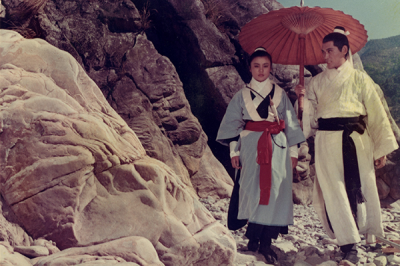
LONG MEN KEZHAN
(Dragon Inn, Taiwan/1967) R.: King Hu. D.: 111'. V. cinese. Digitale
[La locanda del dragone] T. int.: Dragon Inn. T. alt.: Dragon Gate Inn. Scen.: King Hu. F.: Hui-Ying Hua. M.: Hung-Min Chen. Mus.: Lan-Ping Chow. Int.: Ling-Feng, Shang Kuan, Jun Shi, Ying Bai, Feng Hsu, Chien Tsao, Han Hsieh. Prod.: Yung-Fong Sha per Union Film Company. DCP. D.: 111'. Versione cinese con sottotitoli inglesi / Mandarin version with English subtitles
Da: Chinese Taipei Film Archive. Il restauro digitale in 4K è stato realizzato dal Chinese Taipei Film Archive presso il laboratorio L'Immagine Ritrovata a partire dal negativo. Il direttore della fotografia ha supervisionato il color grading / Digital restoration made in 4K by the Chinese Taipei Film Archive AT L'Immagine Ritrovata laboratory in Bologna from the negative. The director of photography has supervised the color grading
In Long men kezhan è chiaro che King Hu si stava allontanando dalle convenzioni narrative occidentali. All'inizio del film si fissano le coordinate storiche e sociopolitiche della vicenda, e la mole di informazioni è tale da rendere quasi impossibile assimilarla; alla fine, dopo aver affrontato difficoltà apparentemente insormontabili, molti personaggi eroici muoiono. Erano situazioni insolite per gli spettatori abituati al cinema hollywoodiano. Dal punto di vista stilistico, Hu elabora e dilata il crescendo che porta alle battaglie nella locanda e 'gioca' con la composizione delle inquadrature e con il montaggio ritmico, sottolineando l'aspetto formale. Iniziamo a percepire l'intensità dello sguardo dei personaggi. Qui la star femminile, Ling-Feng Shang Kuan, assume un ruolo di spicco: la sua Zheng Peipei si traveste da uomo e finge di essere Zhu Hui, il 'fratello' di Zhu Ji (interpretato da Shue Han). Hu fa seguire alla lunga introduzione 15 straordinari minuti di riprese in esterni, dove ogni singola inquadratura è splendidamente composta e dove i variopinti costumi storicamente accurati sono contrapposti a un paesaggio spento, grigiastro e roccioso. Ancora più sorprendente è la scena in cui Zhu Hui fa ritorno alla locanda e combatte con Mao Zongxian (interpretato da Han Yingjie), l'agente di un eunuco (personaggi ricorrenti nei film di Hu). Volano le frecce, le acrobazie sono rese ancora più dinamiche ed eccitanti grazie al formato panoramico e al montaggio costruttivista, e nel turbinio di immagini in cui i personaggi o gli oggetti si limitano talvolta a sfiorare i margini dell'inquadratura, lasciando allo spettatore il compito di colmare le lacune visive - tecnica che David Bordwell definisce "glimpse", balenìo - Hu si rivela vero maestro dell'azione cinematografica. Inoltre, Long men kezhan è il film che sviluppa in maniera più evidente i principi e gli effetti derivati dall'Opera di Pechino. Long men kezhan batté tutti i record di permanenza nelle sale con 105 giorni di programmazione a Taipei, superando al botteghino anche i film di Hong Kong e diventando il titolo in lingua cinese di maggior successo a Taiwan. Riscosse un successo enorme anche in Corea del Sud e nel Sud-est asiatico, e nel 1968 trionfò a Hong Kong [...].
Peter Rist, King Hu. Experimental, narrative filmmaker, in Cinema Taiwan. Politics, Popularity and State of the Arts, edited by Darrell William Davis and Ru-shou Robert Chen, Routledge, London-New York 2007
It is evident in Long men kezhan, that King Hu was departing from Western narrative conventions. So much information is given at the opening of the film establishing the historical and sociopolitical coordinates that it is almost impossible to digest all of it; many heroic characters die at the end after facing seemingly insurmountable odds; both are situations that were unfamiliar to spectators of Hollywood entertainment. Also, stylistically, Hu elaborates and extends the build-up to confrontations in the inn, and 'plays' even more with shot composition and rhythmic editing, especially highlighting the importance of the look. We begin to really feel the intensity of a character's gaze. Here the female star, Shangguan Ling-feng, gets top billing and, like Zheng Peipei she cross-dresses, posing as Zhu Hui, the 'brother' of Zhu Ji (played by Shue Han). Following the aforementioned introduction, Hu provides a stunning fifteen minutes of exterior cinematography, where every shot is beautifully staged and composed and where the colorful, historically accurate costumes are set off against a muted, grayish, rocky landscape. Even more striking is the scene where Zhu Hui returns to the inn and fights Mao Zongxian (played by Han Yingjie), the agent of a eunuch (characters who recur often in Hu's films). With arrows flying through the air and acrobatics made even more dynamic and exciting through the full width of the widescreen frame and editing on the pulse, at the instant something or someone touches the frame edge - what David Bordwell terms the "glimpse" - Hu establishes himself as the true 'master' of cinematic action. In addition, Long men kezhan is the film which most obviously develops the principles and effects derived from Beijing opera. Long men kezhan had a record-breaking run of 105 days in Taipei, topping all Hong Kong and other films at the Taiwan box office, becoming the most successful Chinese-language film till then, on the island; it was also enormously successful in South Korea and Southeast Asian territories, and eventually triumphed in 1968 in Hong Kong [...].
Peter Rist, King Hu. Experimental, narrative filmmaker, in Cinema Taiwan. Politics, Popularity and State of the Arts, edited by Darrell William Davis and Ru-shou Robert Chen, Rout-ledge, London-New York 2007

Tariffe:
Aria condizionata
Accesso disabili
Tel. 051 522285











